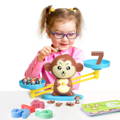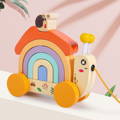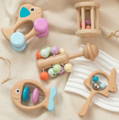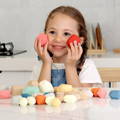Why Choose Wooden Montessori Toys?
Plastic toys have been really, really popular for decades. At the moment, plastic toys account for 90% of the entire toy market. However, nothing beats wooden toys among certain groups of people. In part thanks to their positive impact on the children’s development.
Research from the Center for Early Childhood Education in Connecticut suggests that wooden toys have a classic appeal and positively impact children’s thinking, interaction with peers, and creative expression.

This comeback of wooden toys can somewhat be credited to the influence of Montessori teachings. So…
What Makes a Toy a Montessori Toy?
Montessori toys aren’t like your regular toys. They’re more than toys, actually. Their aim isn’t only to entertain but to help children with hands-on learning and drive them to explore the world.
Here are some characteristics of Montessori toys:
- Simplicity in design
- Educational value
- Use of natural materials like wood or fabric
- Realism in representation
- Open-ended play opportunities
- Encouraging child independence
- Providing sensory engagement

Most Montessori toys are crafted from quality natural materials. That ensures longevity and positions them as eco-friendly and cost-effective alternatives to other toys. Their design, rooted in simplicity and exploration, reflects the core Montessori values.
Speaking of… Let's delve deeper into the materials used…
Why Are Wooden Toys Used in Montessori?
Montessori classrooms are a lot different than traditional educational settings. Instead of primarily lecturing, Montessori teachers serve as guiding figures, offering support and direction.
In this environment, toys - referred to as materials by teachers - aren’t randomly selected. They’re carefully chosen to align with the Montessori philosophy. That’s why, in a Montessori classroom, you usually don’t find the regular toys.
So why aren’t everyday toys like Barbies, LEGOs, and Hot Wheels suitable for Montessori environments? Look at it from a child’s perspective. Imagine walking into a room filled with new faces and colorful toys for the first time. The sensation of new sights and sounds can be overwhelming for most kids.
Modern toys have tons of buttons and light-up features and create loud noises. Some are not suitable for young children. Wooden toys, on the other hand, offer a serene, suiting experience. They’re quiet, simple, and engaging. These features align perfectly with the Montessori approach.

Why Do Montessori Schools and Parents Choose Wooden Toys?
Safety and nature are at the heart of the Montessori method. Wooden toys, being natural, connect kids to the environment and offer added safety. It's no secret that kids often explore toys with their mouths. That’s why the Montessori community values the safety of wooden toys.
That’s not the only reason why Montessori schools and parents prefer wood as a material:
- Sensorial Experience: Montessori values the development of the child’s senses. Natural materials like wood have unique textures, weights, and even smells that are richer than those of other materials.
- Environmental Care: Montessori schools and parents teach kids to be responsible when it comes to caring about the environment.
- Avoiding Overstimulation: Many modern toys are bright, flashy, and loud. While these capture the child’s attention, they can overstimulate your child’s brain and distract them from deep, focused play.
When you weigh the benefits, the case for wooden toys becomes clear: they're durable, less likely to break, and overall safer for curious hands and mouths.
Are All Wooden Toys Montessori?

No, not all wooden toys are necessarily Montessori. Wooden toys are a staple in Montessori settings, but wood alone doesn't define a Montessori toy. The essence lies in the toy's purpose and design: simplicity, functionality, and the promotion of hands-on learning.
You have wooden, plastic, and even fabric Montessori toys. Some are even made out of clay. However, wooden toys are the most popular. They’re natural, durable, and just classic. What’s more, wooden toys have been around for millennia, and from the look of it, they’ll be around for a few more.
How to Choose Wooden Montessori Toys?
When choosing Montessori wooden toys, it’s important to choose ones appropriate for your child’s age, ensure they offer versatility for imaginative play, and are easy to maintain. Below, you can find the criteria for selecting these wooden toys. Oh, and a few cool examples, too:
1. Age-Range
Different Montessori wooden toys are designed to cater to different age groups. They need to suit all of the developmental phases your child goes through. It’s really important the toy you select matches the age of your child. Some wooden blocks might be enough for a toddler to keep their attention, however, for an older child, a more complex puzzle will do the trick.
Case in Point: Montessori Pulling Snail

A dual-purpose gem! It's both a pull-along toy and a sorter, refining gross and fine motor skills, respectively. Montessori toys for 1-year-olds like this keep children’s attention while keeping them active at all times.
2. Versatility
You need to look for multipurpose toys. What do we mean by that? A simple set of wooden blocks can morph into towers, roads, and patterns. Versatile toys will spark your child’s imagination and keep them at play for hours. All while helping them learn how to seek patterns and create new ideas.
Case in Point: Montessori Wooden Tetris

Beyond being an exercise in logic and spatial reasoning, Tetris pieces are adaptable for other fun games. With this Montessori wooden set, your child will practice patience and increase focus.
3. Maintain Simplicity
Kids are naturally curious, which means toys can sometimes get messy. Opt for wooden toys that are fuss-free to clean, like those that can be swiftly wiped down.
Case in Point: Montessori Rattle Kit

A sturdy rattle is a childhood staple. These are not only durable but also a breeze to clean up after playtime.
What Are the Benefits of Wooden Montessori Toys?
Millions of people, including celebrities like Steph Curry, Jeff Bezos, and Taylor Swift, are fans of the Montessori. Toys built in accordance with the Montessori method come with numerous advantages. Some of the biggest benefits of wooden Montessori toys are boosting skills development, improving critical thinking, and cultivating motor skills.
But that’s not all. Let’s look at the top benefits of wooden Montessori toys in detail.
1. Boosting Skills Development
Engaging with natural materials, especially wood, can have profound effects on a child’s concentration and tranquility. Numerous studies, like the one from Chiba University, reveal that the simple act of touching wood can induce physiological relaxation.
Montessori toys, designed for various developmental stages, ranging from sensory activities to self-learning exercises, cater to children's evolving needs. For instance, Montessori wooden stones are designed for 3-year-olds.

The stones fit perfectly together, which allows your 3-year-old to stack them on top of each other. In turn, that helps them develop fine motor skills, hand-eye coordination, and balance.
2. Improving Critical Thinking
In a world flooded with flashy, noise-making toys, wooden Montessori toys stand out by emphasizing cognitive growth. Such toys are devoid of the distractions that often stifle a child’s imagination and problem-solving capacities.
Around the 9-month mark, babies begin to comprehend cause and effect—simple actions like dropping a block can captivate them. By offering a more basic play experience, wooden toys amplify this learning curve.
They instill concepts like perseverance, object permanence, and hands-on learning. A classic wooden puzzle, for instance, offers both a challenge and entertainment, pushing children to think critically and imaginatively.
3. The Durability Factor
If you want your child to have a more immersive play experience, they should focus on fewer toys. The Montessori philosophy underscores this with their minimalist play spaces, primarily adorned with versatile wooden toys that encourage open-ended play.
Research from 2017 highlights that toddlers engage in more quality playtime when presented with fewer toys. In the study, most children preferred just 4 to 16 toys. Wooden toys are simple to play with. They don’t have too many buttons, levers, or moving parts. That allows them to spark your child’s imagination and play with them for a long time.

Beyond their educational value, these toys are also incredibly durable. Built from natural materials, they withstand the test of time, ensuring that children can enjoy them for years, fostering a deeper bond and understanding with each play session.
4. Cultivating Fine Motor Skills
It's a common misconception that fine motor skills, which relate to our hand and finger movements, naturally evolve as kids grow. In truth, these skills intertwine deeply with cognitive development.
Research published in the Early Childhood Education Journal showed that children with underdeveloped motor skills often face academic and behavioral challenges. Many never outgrow the initial setbacks. Montessori toys, especially wooden ones, intentionally address this.
Toys like wooden stackers or building blocks require precision and focus. Children must coordinate their eyes and hands to balance blocks or align pieces correctly, actively honing their fine motor skills in the process.
5. No Need for Batteries
One of the most underappreciated benefits of wooden toys is how they save parents from the recurring costs and environmental implications of batteries. It's frustrating when a child's favorite toy suddenly goes silent, demanding battery replacements just moments into playtime.
With wooden toys, this is not an issue.
Getting wooden toys for your child will keep you from spending additional money replacing batteries every few weeks. Only last year, people spent nearly $7 billion on triple-A batteries worldwide.
Wooden toys also force your child to explore, manipulate the toy's pieces independently, and discover how it works by hand. Instead of batteries, wooden toys are powered by the creativity and imagination of your child.
Conclusion
Wooden Montessori toys offer benefits that go way beyond simple play. You see, these aren’t just toys. These are learning tools. Cognitive growth. Critical thinking. Motor skills. Your kid will be able to improve all of these areas.
They are sturdy, so you won’t have to look over your child’s shoulder to ensure they don’t break them. Wooden toys will stand the test of time, and their versatility will make sure that your child doesn’t grow tired of them after a few weeks of play.
The world is full of overly expensive, short-lasting toys and digital distractions. Wooden Montessori toys serve as a reminder of simpler times.
If you have any more questions, don't hesitate to reach out to Montessori Generation. Our team is here to guide and answer any questions you may have, so contact us today.
Free Delivery
Over $80
Easy Returns
No questions asked
Unbeatable Warranty
1-year ++ warranty
- Secure CheckoutWorld’s most secure payment method




